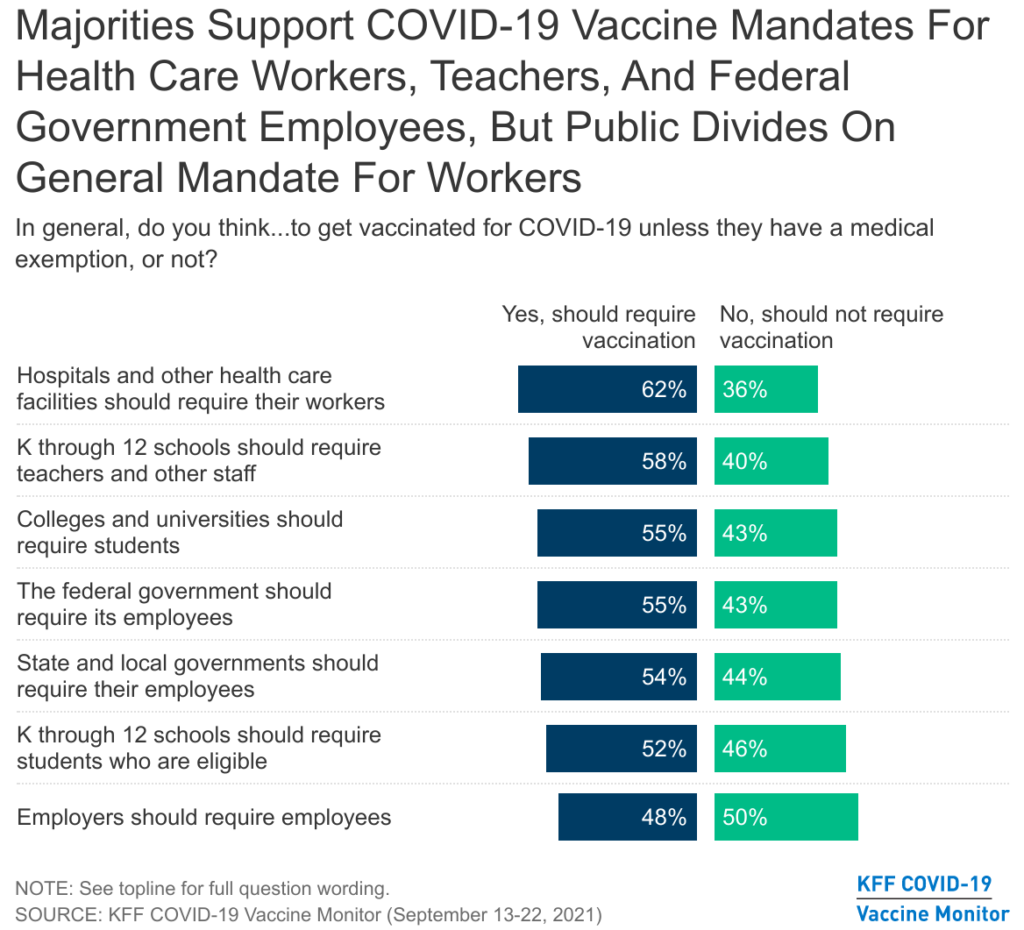
Sixty-two percent of respondents to a new survey said COVID-19 vaccines should be required for healthcare workers, and 48% said they support employers in general requiring vaccination as a condition of employment.
Thirty-six percent of participants in the Kaiser Family Foundation COVID-19 Vaccine Monitor survey, however, said that healthcare workers should not be required to be vaccinated.
The majority of survey respondents (58%) said they support the federal mandate for vaccination or weekly testing by larger employers, compared with 39% who said they oppose such requirements. A large majority of unvaccinated workers (87%) said they oppose their own employer mandating that workers be inoculated, as do a substantial share of vaccinated workers (35%).
Unvaccinated workers polled about employer COVID-19 vaccine mandates said they likely would get vaccinated (34%), but 15% said they would be “not too likely” to get vaccinated, and half said they would be “not at all likely” to get vaccinated.
When presented with the option of weekly testing, most unvaccinated workers (56%) said they would opt for the testing option, whereas 12% indicated they would get the shot and 30% said they would leave their jobs.
The September KFF COVID-19 Vaccine Monitor surveyed 1,519 adults 18 and older, and was conducted Sept. 13 to 22 by telephone.
72% of respondents at least partially vaccinated
Overall, 72% of U.S. adults reported being at least partially vaccinated against COVID-19, with the rise of the delta variant and associated hospitalizations and deaths serving as the main motivator. The approval of booster doses by federal officials has complicated the situation, however.
Of those adults vaccinated after June 1, survey respondents said the increase in cases due to the delta variant (39%), hospitalizations (38%) and knowing someone who became seriously ill or died from the virus (36%) were the major reasons for vaccination. Others said they were motivated by participation limits on travel or events (35%), employer mandates or social pressure from family and friends (19%), full approval of the Pfizer-BioNTech vaccine (15%) or financial incentives from an employer (7%).
“Nothing motivates people to get vaccinated quite like the impact of seeing a family member, friend or neighbor die or become seriously ill with COVID-19, or to worry that your hospital might not be able to save your life if you need it,” KFF President and CEO Drew Altman said in a press release. “When a theoretical threat becomes a clear and present danger, people are more likely to protect themselves and their loved ones.”
For older adults aged more than 65 years, 85% reported receiving at least one vaccine dose, 8% said they definitely would not get vaccinated, 1% reported they would get the vaccine only if required, 3% said they are taking a wait-and-see approach, and 2% said they intend to get vaccinated as soon as possible.
Booster confusion
But with recent recommendations from the U.S. Food and Drug Administration and the Centers for Disease Control and Prevention regarding COVID-19 booster shots, reaction to booster information varied widely depending on vaccination status.
Overall, 62% of adults said the news about boosters “shows that scientists are continuing to find ways to make vaccines more effective,” whereas one-third said that it “shows that the vaccines are not working as well as promised.”
Among those who are at least partially vaccinated, more than half (54%) said they found the information helpful, compared with 35% who said they found it confusing. Only 19% of vaccinated individuals said that the news on boosters was a sign that the vaccines are not working, compared with 62% who said it shows that science is finding ways to make vaccines more effective.
Among unvaccinated adults, the script was flipped, with almost 45% reporting that the information was confusing, whereas 24% found it helpful. In this group, 71% said news about boosters is a sign that the vaccines are working.
Pew Research Center survey
A separate survey by the Pew Research Center found that unvaccinated adults are less likely to be concerned about the virus.
According to the survey, unvaccinated adults are approximately half as likely as those who have receive at least one vaccine dose to see COVID-19 as a major threat to the health of the U.S. population (37% versus 70%) and also less likely to see it as a major threat to their own personal health (21% versus 25%).
Unvaccinated adults also expressed less concern about unknowingly spreading the virus to others. Approximately 38% of unvaccinated Americans said they are very or somewhat concerned about spreading the virus compared with 66% who are partially or fully vaccinated. And 61% of unvaccinated adults said they are not too concerned or not at all concerned about unknowingly spreading the virus to others.
Those who are not vaccinated said they are “notably skeptical” about guidance from public health officials on the pandemic — 80% of unvaccinated adults said public health officials are not telling the public everything they know about COVID-19 vaccines, compared with 44% of partially or fully vaccinated adults who said they agreed with that statement.
The Pew Research Center’s survey was conducted Aug. 23 to 29.




